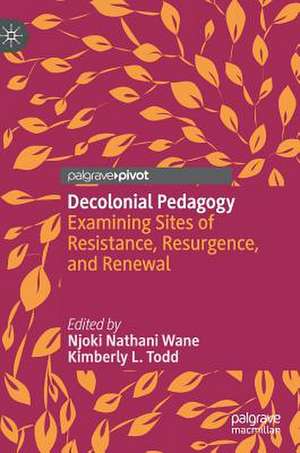Decolonial Pedagogy: Examining Sites of Resistance, Resurgence, and Renewal
Editat de Njoki Nathani Wane, Kimberly L. Todden Limba Engleză Hardback – 21 noi 2018
Preț: 468.44 lei
Preț vechi: 551.10 lei
-15% Nou
Puncte Express: 703
Preț estimativ în valută:
89.65€ • 93.25$ • 74.01£
89.65€ • 93.25$ • 74.01£
Carte tipărită la comandă
Livrare economică 15-29 aprilie
Preluare comenzi: 021 569.72.76
Specificații
ISBN-13: 9783030015381
ISBN-10: 3030015386
Pagini: 132
Ilustrații: XV, 144 p. 1 illus.
Dimensiuni: 148 x 210 mm
Greutate: 0.35 kg
Ediția:1st ed. 2018
Editura: Springer International Publishing
Colecția Palgrave Pivot
Locul publicării:Cham, Switzerland
ISBN-10: 3030015386
Pagini: 132
Ilustrații: XV, 144 p. 1 illus.
Dimensiuni: 148 x 210 mm
Greutate: 0.35 kg
Ediția:1st ed. 2018
Editura: Springer International Publishing
Colecția Palgrave Pivot
Locul publicării:Cham, Switzerland
Cuprins
Chapter 1. Introduction: A Meeting of Decolonial Minds, Njoki N. Wane and Kimberly L. Todd.- Chapter 2. The University as a Neoliberal and Colonizing Institute: A Spatial Case Study Analysis of the Invisible Fence between York University and the Jane Finch Neighbourhood in the City of Toronto, Ardavan Eizadirad.- Chapter 3: Decolonizing Knowledge in Hegemonic Psychological Science, Glenn Adams, Tuğçe Kurtiş, Luis Gómez, Ludwin E. Molina, Ignacio Dobles.- Chapter 4. Reviving the Spirit by Making the Case for Decolonial Curricula, Kimberly L. Todd and Valerie Robert.- Chapter 5. Training for "Global Citizenship" but Local Irrelevance: The Case of An Upscale Nigerian Private Secondary School, Chizoba Imoka.- Chapter 6. Using Arts-Based Learning as a Site of Critical Resistance, Marilyn Oladimeji.- Chapter 7. Awakening the Seed of Kenyan Women's Narratives on Food Production: A Glance at African Indigenous Technology, Njoki N. Wane.- Chapter 8. Role of Latent Local Technologies and Innovations to Catapult Development in Kenya, Njiruh Paul Nthakanio and Eucharia Kenya.- Chapter 9. Conclusion: The Way Forward, Njoki N. Wane and Kimberly L. Todd.
Notă biografică
Njoki N. Wane is Chair of the Department of Social Justice Education at the Ontario Institute for Studies in Education (OISE) at the University of Toronto, Canada. Wane’s research interests include African Indigenous knowledges, spirituality, anti-colonial, decolonial, and decolonization theory.
Kimberly L. Todd is a PhD candidate in Department of Social Justice Education at the Ontario Institute of Studies in Education (OISE) at the University of Toronto, Canada. Todd’s research interests include teacher Praxis and education, decolonization, Indigenous epistemologies, dreaming, and spiritual knowledges.
Kimberly L. Todd is a PhD candidate in Department of Social Justice Education at the Ontario Institute of Studies in Education (OISE) at the University of Toronto, Canada. Todd’s research interests include teacher Praxis and education, decolonization, Indigenous epistemologies, dreaming, and spiritual knowledges.
Textul de pe ultima copertă
Through innovative and critical research, this anthology inquires and challenges issues of race and positionality, empirical sciences, colonial education models, and indigenous knowledges. Chapter authors from diverse backgrounds present empirical explorations that examine how decolonial work and Indigenous knowledges disrupt, problematize, challenge, and transform ongoing colonial oppression and colonial paradigm. This book utilizes provocative and critical research that takes up issues of race, the shortfalls of empirical sciences, colonial education models, and the need for a resurgence in Indigenous knowledges to usher in a new public sphere. This book is a testament of hope that places decolonization at the heart of our human community.
Caracteristici
Includes extensive new research covering historical developments, the decolonization of systemic structures, and colonial logics Brings together multiple intersectional fields of study, including engaging with indigenous knowledges and sites of oppression Features contributions from authors in a diverse range of countries, offering unique perspectives
